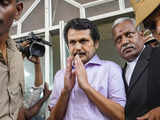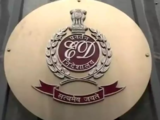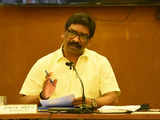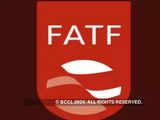Suggest a new Definition
Proposed definitions will be considered for inclusion in the Economictimes.com
What is 'Money laundering'
Money Laundering
An abundance of black money leads to the origin of several illegal practices, and money laundering is one such process to disguise the source of such funds.
What is Money Laundering?
Money laundering is the process of hiding the source of money obtained from illegal sources and converting it to a clean source, thereby avoiding prosecution, conviction, and confiscation of the criminal funds. It is an illegal exercise that converts black money into white money.
Money laundering is a serious financial crime. Anti-money laundering measures have gained importance to prevent and curb such practices.
Process of Money Laundering
Money laundering is a three-step process, namely, placement, layering, and integration.
Placement- At this stage, the money launderers inject the crime money into the financial system. That is often done by depositing funds into a bank account registered to an anonymous corporation or a professional middleman.
Layering- The money so injected by placement is moved or spread over various transactions in different accounts of the same country and other countries where anti-money laundering laws are not so stringent, thus, making it difficult to trace the source.
Transactions like the purchase of tradable assets like expensive cars, artwork, and real estate can also be included in layering the funds.
Integration- Such well-placed and well-layered money again enter the financial system, obliterating the original association with crime and using such laundered money as if it came from clean sources, thus defeating the law.
The criminal might then invest such clean money into a legal business claiming payment by producing fake invoices or even start a bogus charity, placing themselves on the board of directors with an exorbitant salary.
How is Money Laundering done?
The ways to launder money are always evolving as criminals have come up with creative ways to launder their illicit funds. The most commonly used methods of money laundering are-
Smurfing- Smurfing, also referred to as structuring, is when criminals break a large number of funds into small chunks of cash, making multiple transactions and spreading the amount to different accounts, thereby making it hard to detect the origin.
Electronic money- There are many ways where criminals can acquire money, whether by infusing malware, phishing, account hackers, or other vectors. Stored value cards are often used to launder such illegal money by purchasing items from that money.
Offshore Accounts- Individuals with unexplained excess credits place such money into bank accounts of countries with less or no jurisdiction related to anti-money laundering. The no disclosure policy in those tax haven countries makes the criminals feel safe, defeating the law.
Money Mules- Cash smugglers who help carry the illegal cash across different countries and deposit that cash in countries with less stringent tax laws are equally liable as the money launderer is.
Cryptocurrencies- The newly inserted online transacting currency in the form of cryptos such as Bitcoin and several others has increased the chances of money laundering. Increasing amounts of OTC trade might result in the heavy transfer of funds between countries. The lack of strict KYC norms in some cryptocurrencies has also acted as an invitation to money laundering.
Casinos- Money launderers buy chips from the casinos with their cash and later get those chips exchanged with checks provided by the casinos, sometimes without betting or gambling.
Prevention of Money Laundering
It is a huge step back for the governments as approximately US$800 billion to US$2 trillion of the estimated amount is laundered globally every year.
Financial Action Task Force (FATF) was formed as an international committee in 1989 by the Group of Seven (G7) nations to fight money laundering internationally.
The Bank Secrecy Act passed by the United States in 1970 asks financial institutions to report suspicious transactions or cash transactions exceeding $10,000 to the Department of the Treasury.
The USA Patriot Act assists in tracking money laundering by investigating and preventing organized crimes and drug trafficking, which can also be helpful in terrorist tracking.
Why prevent money laundering?
Money laundering is a bane to society as a whole. It makes the rich richer and thereby causing an imbalance in society. Legitimizing the proceeds of illegal activities like drug trafficking, terrorism funding, people smuggling, etc., have a tremendous social and economic cost on the society. Therefore, money laundering should be combated.
What is anti-money laundering?
Anti-money laundering is the opposite of money laundering as it bereaves the criminal of their illegal money and thereby helping the government and economy at large.
How can banks prevent money laundering?
Banks can prevent money laundering by following government guidelines like proper KYC, Customer due diligence, suspicious activity reporting, customer and transaction screening, etc.
Disclaimer: This content is authored by an external agency. The views expressed here are that of the respective authors/ entities and do not represent the views of Economic Times (ET). ET does not guarantee, vouch for or endorse any of its contents nor is responsible for them in any manner whatsoever. Please take all steps necessary to ascertain that any information and content provided is correct, updated and verified. ET hereby disclaims any and all warranties, express or implied, relating to the report and any content therein.
An abundance of black money leads to the origin of several illegal practices, and money laundering is one such process to disguise the source of such funds.
What is Money Laundering?
Money laundering is the process of hiding the source of money obtained from illegal sources and converting it to a clean source, thereby avoiding prosecution, conviction, and confiscation of the criminal funds. It is an illegal exercise that converts black money into white money.
Money laundering is a serious financial crime. Anti-money laundering measures have gained importance to prevent and curb such practices.
Process of Money Laundering
Money laundering is a three-step process, namely, placement, layering, and integration.
Placement- At this stage, the money launderers inject the crime money into the financial system. That is often done by depositing funds into a bank account registered to an anonymous corporation or a professional middleman.
Layering- The money so injected by placement is moved or spread over various transactions in different accounts of the same country and other countries where anti-money laundering laws are not so stringent, thus, making it difficult to trace the source.
Transactions like the purchase of tradable assets like expensive cars, artwork, and real estate can also be included in layering the funds.
Integration- Such well-placed and well-layered money again enter the financial system, obliterating the original association with crime and using such laundered money as if it came from clean sources, thus defeating the law.
The criminal might then invest such clean money into a legal business claiming payment by producing fake invoices or even start a bogus charity, placing themselves on the board of directors with an exorbitant salary.
How is Money Laundering done?
The ways to launder money are always evolving as criminals have come up with creative ways to launder their illicit funds. The most commonly used methods of money laundering are-
Smurfing- Smurfing, also referred to as structuring, is when criminals break a large number of funds into small chunks of cash, making multiple transactions and spreading the amount to different accounts, thereby making it hard to detect the origin.
Electronic money- There are many ways where criminals can acquire money, whether by infusing malware, phishing, account hackers, or other vectors. Stored value cards are often used to launder such illegal money by purchasing items from that money.
Offshore Accounts- Individuals with unexplained excess credits place such money into bank accounts of countries with less or no jurisdiction related to anti-money laundering. The no disclosure policy in those tax haven countries makes the criminals feel safe, defeating the law.
Money Mules- Cash smugglers who help carry the illegal cash across different countries and deposit that cash in countries with less stringent tax laws are equally liable as the money launderer is.
Cryptocurrencies- The newly inserted online transacting currency in the form of cryptos such as Bitcoin and several others has increased the chances of money laundering. Increasing amounts of OTC trade might result in the heavy transfer of funds between countries. The lack of strict KYC norms in some cryptocurrencies has also acted as an invitation to money laundering.
Casinos- Money launderers buy chips from the casinos with their cash and later get those chips exchanged with checks provided by the casinos, sometimes without betting or gambling.
Prevention of Money Laundering
It is a huge step back for the governments as approximately US$800 billion to US$2 trillion of the estimated amount is laundered globally every year.
Financial Action Task Force (FATF) was formed as an international committee in 1989 by the Group of Seven (G7) nations to fight money laundering internationally.
The Bank Secrecy Act passed by the United States in 1970 asks financial institutions to report suspicious transactions or cash transactions exceeding $10,000 to the Department of the Treasury.
The USA Patriot Act assists in tracking money laundering by investigating and preventing organized crimes and drug trafficking, which can also be helpful in terrorist tracking.
Why prevent money laundering?
Money laundering is a bane to society as a whole. It makes the rich richer and thereby causing an imbalance in society. Legitimizing the proceeds of illegal activities like drug trafficking, terrorism funding, people smuggling, etc., have a tremendous social and economic cost on the society. Therefore, money laundering should be combated.
What is anti-money laundering?
Anti-money laundering is the opposite of money laundering as it bereaves the criminal of their illegal money and thereby helping the government and economy at large.
How can banks prevent money laundering?
Banks can prevent money laundering by following government guidelines like proper KYC, Customer due diligence, suspicious activity reporting, customer and transaction screening, etc.
Disclaimer: This content is authored by an external agency. The views expressed here are that of the respective authors/ entities and do not represent the views of Economic Times (ET). ET does not guarantee, vouch for or endorse any of its contents nor is responsible for them in any manner whatsoever. Please take all steps necessary to ascertain that any information and content provided is correct, updated and verified. ET hereby disclaims any and all warranties, express or implied, relating to the report and any content therein.
Related News
 Former TN Minister Senthil Balaji constantly filing petitions to stall trial: EDThe Enforcement Directorate informed a sessions court that former Tamil Nadu Minister V Senthil Balaji has been filing numerous petitions to delay trial proceedings in a money laundering case. This was stated by Karthik Dasari, Deputy Director, Chennai Zonal Office, Directorate of Enforcement, in his counter affidavit submitted to Principal Sessions Judge S Alli. Dasari claimed that Balaji's actions have an "ulterior motive to stall the trial proceedings" and are causing delays in the trial's commencement.
Former TN Minister Senthil Balaji constantly filing petitions to stall trial: EDThe Enforcement Directorate informed a sessions court that former Tamil Nadu Minister V Senthil Balaji has been filing numerous petitions to delay trial proceedings in a money laundering case. This was stated by Karthik Dasari, Deputy Director, Chennai Zonal Office, Directorate of Enforcement, in his counter affidavit submitted to Principal Sessions Judge S Alli. Dasari claimed that Balaji's actions have an "ulterior motive to stall the trial proceedings" and are causing delays in the trial's commencement. Delhi HC to rule on BRS leader K Kavitha's bail plea in Excise Case on July 1BRS leader K Kavitha was arrested by the Enforcement Directorate on March 15, 2024 and by the Central Bureau of Investigation (CBI) on April 11, 2024. The bench of Justice Swarna Kanta Sharma, after hearing submissions from all sides, decided to reserve the order in the matter on May 28, 2024.
Delhi HC to rule on BRS leader K Kavitha's bail plea in Excise Case on July 1BRS leader K Kavitha was arrested by the Enforcement Directorate on March 15, 2024 and by the Central Bureau of Investigation (CBI) on April 11, 2024. The bench of Justice Swarna Kanta Sharma, after hearing submissions from all sides, decided to reserve the order in the matter on May 28, 2024. Kerala: ED attaches land, bank deposits of CPI(M) in money laundering caseThe Enforcement Directorate has attached a land parcel in Kerala and bank deposits worth Rs 73 lakh, alleged to belong to the CPI(M), in connection with a money laundering probe related to the Karuvannur Service Cooperative Bank "scam." The CPI(M) has denied allegations of wrongdoing and money laundering.
Kerala: ED attaches land, bank deposits of CPI(M) in money laundering caseThe Enforcement Directorate has attached a land parcel in Kerala and bank deposits worth Rs 73 lakh, alleged to belong to the CPI(M), in connection with a money laundering probe related to the Karuvannur Service Cooperative Bank "scam." The CPI(M) has denied allegations of wrongdoing and money laundering. FATF lauds India efforts to combat laundering and terrorist financingThe Financial Action Task Force (FATF) has recognized India's achievements in combating money laundering and terrorism funding. The MER, adopted in Singapore, places India in the'regular follow-up' category, a distinction shared by only four other G20 countries. The MER assessed India's measures and compliance with FATF norms.
FATF lauds India efforts to combat laundering and terrorist financingThe Financial Action Task Force (FATF) has recognized India's achievements in combating money laundering and terrorism funding. The MER, adopted in Singapore, places India in the'regular follow-up' category, a distinction shared by only four other G20 countries. The MER assessed India's measures and compliance with FATF norms. Hemant Soren gets bail from HC, says fight will continueThe release, ahead of possible early assembly elections in October-November, has come as a shot in the arm for JMM-Congress-RJD alliance in Jharkhand. Soren has been in jail since January 31 after ED arrested him in a money laundering case.
Hemant Soren gets bail from HC, says fight will continueThe release, ahead of possible early assembly elections in October-November, has come as a shot in the arm for JMM-Congress-RJD alliance in Jharkhand. Soren has been in jail since January 31 after ED arrested him in a money laundering case. Falsely implicated, I was forced to spend 5 months in jail: Hemant SorenHemant Soren, falsely implicated, faced months in jail over a money laundering case. Accused the government of voice suppression, arrested amid a conspiracy. Vows to continue the fight against injustice, emphasizing the completion of tasks despite the lengthy judicial process and allegations of a land scam.
Falsely implicated, I was forced to spend 5 months in jail: Hemant SorenHemant Soren, falsely implicated, faced months in jail over a money laundering case. Accused the government of voice suppression, arrested amid a conspiracy. Vows to continue the fight against injustice, emphasizing the completion of tasks despite the lengthy judicial process and allegations of a land scam. ED files ninth charge sheet in Delhi excise policy caseHe was the 18th person to have been arrested by the ED in this case in which it has also taken into custody Delhi Chief Minister and AAP supremo Arvind Kejriwal, his party colleague and former deputy chief minister Manish Sisodia, Aam Aadmi Party (AAP) MP Sanjay Singh, BRS leader and former Telangana CM K Chandrashekar Rao's politician daughter K Kavitha and several liquor businessmen and others.
ED files ninth charge sheet in Delhi excise policy caseHe was the 18th person to have been arrested by the ED in this case in which it has also taken into custody Delhi Chief Minister and AAP supremo Arvind Kejriwal, his party colleague and former deputy chief minister Manish Sisodia, Aam Aadmi Party (AAP) MP Sanjay Singh, BRS leader and former Telangana CM K Chandrashekar Rao's politician daughter K Kavitha and several liquor businessmen and others. FATF adds Monaco, Venezuela to money laundering 'grey list'Both countries now made high-level political commitments to work with the body and implement an action plan to strengthen the effectiveness of their regulation, the FATF said.
FATF adds Monaco, Venezuela to money laundering 'grey list'Both countries now made high-level political commitments to work with the body and implement an action plan to strengthen the effectiveness of their regulation, the FATF said. India passes anti-money laundering review, but FATF calls for improved oversight in non-financial sectorsIndia's compliance with anti-money laundering rules under FATF scrutiny includes improving supervision in non-financial sectors and facing criticism over counter-terrorism laws, with the country being a member of the FATF alongside major economies like the US, Japan, France, EU, and China.
India passes anti-money laundering review, but FATF calls for improved oversight in non-financial sectorsIndia's compliance with anti-money laundering rules under FATF scrutiny includes improving supervision in non-financial sectors and facing criticism over counter-terrorism laws, with the country being a member of the FATF alongside major economies like the US, Japan, France, EU, and China. Who is Cryptoqueen Ruja Ignatova? Why is there multi-million dollar bounty?Ruja Ignatova who has been accused in a multi-billion-dollar scam has a $4 million bounty on her head. This has been offered by the FBI which has sought the assistance to locate her. She has accused of selling fake cryptocurrency to the customers of ‘One Coin’ of which she is a co-founder.
Who is Cryptoqueen Ruja Ignatova? Why is there multi-million dollar bounty?Ruja Ignatova who has been accused in a multi-billion-dollar scam has a $4 million bounty on her head. This has been offered by the FBI which has sought the assistance to locate her. She has accused of selling fake cryptocurrency to the customers of ‘One Coin’ of which she is a co-founder.
Load More